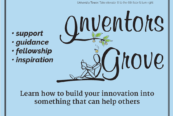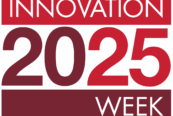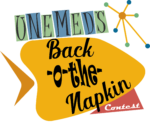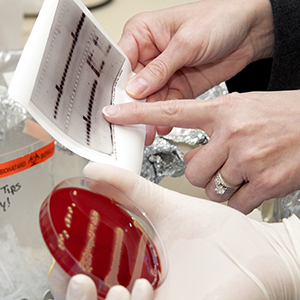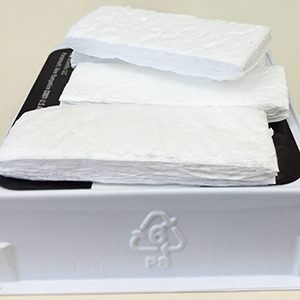OMAHA, Neb. (Jan. 30, 2014)—UNeMed Corporation’s educational outreach program, the Innovation Seminar Series, continued Thursday afternoon with a talk from Deven Dandekar, PhD, at the University of Nebraska Medical Center’s Durham Research Center.
Dandekar, the director of toxicology at Xenometrics, L.L.C., delivered “Drug Development Strategies, from Discovery to the Clinic” to a standing-room only crowd of 50.
He outlined the meticulous steps needed to make the best selection possible for drug candidates. He then discussed the best practices of early-stage testing that can lead to a more efficient path to FDA approval.
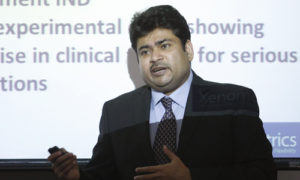
Deven Dandekar, PhD, the director of toxicology at Xenometrics, addresses a gathering of 50 researchers, faculty and students during a recent seminar about drug development. (UNeMed Photo)
One point of emphasis was to think like a regulator when designing tests.
“It’s good to put your regulator hat on, and say ‘What do we need in the end,'” Dandekar said.
A copy of the presentation slideshow is available for UNMC faculty, staff and students. Contact Matt Boehm at UNeMed for details.
Late in the presentation, Matthew Frick, Xenometrics’ director of business development, reminded the assembled group of researchers, faculty and students that drug research is a “business of failure.”
He estimated that the average timeline is about eight years from discovery to product launch, and can cost between $400 million and $800 million. For every 10,000 candidates, just 250 will make it to the preclinical stage and only 10 advance to proof-of-concept testing. Only one in 10,000 will become a product, Frick said.
Dandekar also illustrated the most common reasons for failure in clinical trials, including adverse effects to the cardiovascular and central nervous systems. Those failures could often be traced back to insufficient screening in early testing. A more thorough screening process in early stages can help diminish those risks of failure, he said.
It also helps to have a more open partnership with potential resources, such as external contract laboratories.
“Think of your contract lab as a collaborator,” Dandekar said. “If you think of them as a service provider and withhold information, it won’t work out.”
Xenometrics, L.L.C., is a contract research organization providing study services to the biotechnology, pharmaceutical, companion animal health, and industrial- and agro-chemical industries. Xenometrics’ study services include PK/ADME, general toxicology, safety pharmacology, and development and reproductive toxicology studies.
UNeMed is the technology transfer office for UNMC, serving researchers, faculty and staff who develop new biomedical technology and inventions. UNeMed strives to help bring those innovations to the marketplace for a healthier and better world.



